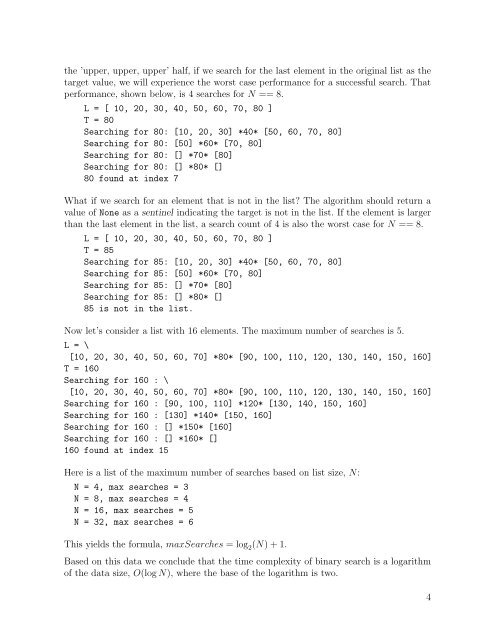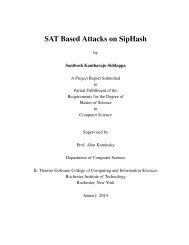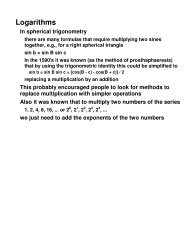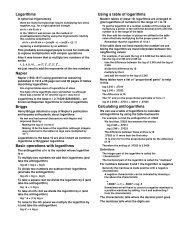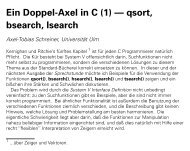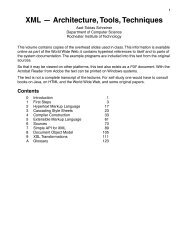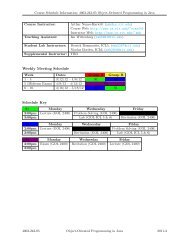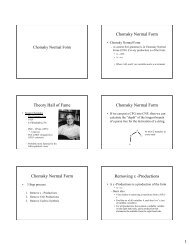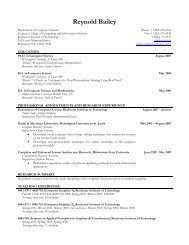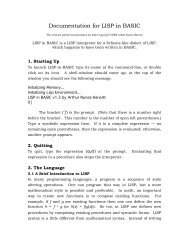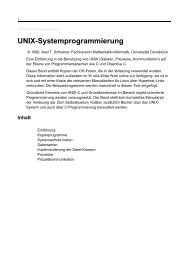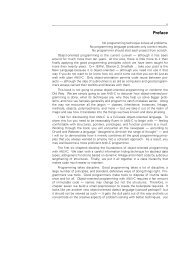Computer Science I CSCI-141 Search Lecture (2/2) - Department of ...
Computer Science I CSCI-141 Search Lecture (2/2) - Department of ...
Computer Science I CSCI-141 Search Lecture (2/2) - Department of ...
You also want an ePaper? Increase the reach of your titles
YUMPU automatically turns print PDFs into web optimized ePapers that Google loves.
the ’upper, upper, upper’ half, if we search for the last element in the original list as the<br />
target value, we will experience the worst case performance for a successful search. That<br />
performance, shown below, is 4 searches for N == 8.<br />
L = [ 10, 20, 30, 40, 50, 60, 70, 80 ]<br />
T = 80<br />
<strong>Search</strong>ing for 80: [10, 20, 30] *40* [50, 60, 70, 80]<br />
<strong>Search</strong>ing for 80: [50] *60* [70, 80]<br />
<strong>Search</strong>ing for 80: [] *70* [80]<br />
<strong>Search</strong>ing for 80: [] *80* []<br />
80 found at index 7<br />
What if we search for an element that is not in the list? The algorithm should return a<br />
value <strong>of</strong> None as a sentinel indicating the target is not in the list. If the element is larger<br />
than the last element in the list, a search count <strong>of</strong> 4 is also the worst case for N == 8.<br />
L = [ 10, 20, 30, 40, 50, 60, 70, 80 ]<br />
T = 85<br />
<strong>Search</strong>ing for 85: [10, 20, 30] *40* [50, 60, 70, 80]<br />
<strong>Search</strong>ing for 85: [50] *60* [70, 80]<br />
<strong>Search</strong>ing for 85: [] *70* [80]<br />
<strong>Search</strong>ing for 85: [] *80* []<br />
85 is not in the list.<br />
Now let’s consider a list with 16 elements. The maximum number <strong>of</strong> searches is 5.<br />
L = \<br />
[10, 20, 30, 40, 50, 60, 70] *80* [90, 100, 110, 120, 130, 140, 150, 160]<br />
T = 160<br />
<strong>Search</strong>ing for 160 : \<br />
[10, 20, 30, 40, 50, 60, 70] *80* [90, 100, 110, 120, 130, 140, 150, 160]<br />
<strong>Search</strong>ing for 160 : [90, 100, 110] *120* [130, 140, 150, 160]<br />
<strong>Search</strong>ing for 160 : [130] *140* [150, 160]<br />
<strong>Search</strong>ing for 160 : [] *150* [160]<br />
<strong>Search</strong>ing for 160 : [] *160* []<br />
160 found at index 15<br />
Here is a list <strong>of</strong> the maximum number <strong>of</strong> searches based on list size, N:<br />
N = 4, max searches = 3<br />
N = 8, max searches = 4<br />
N = 16, max searches = 5<br />
N = 32, max searches = 6<br />
This yields the formula, max<strong>Search</strong>es = log 2 (N)+1.<br />
Based on this data we conclude that the time complexity <strong>of</strong> binary search is a logarithm<br />
<strong>of</strong> the data size, O(logN), where the base <strong>of</strong> the logarithm is two.<br />
4


